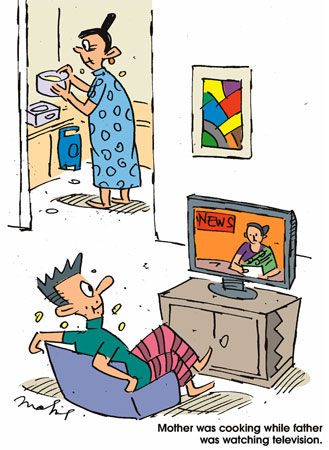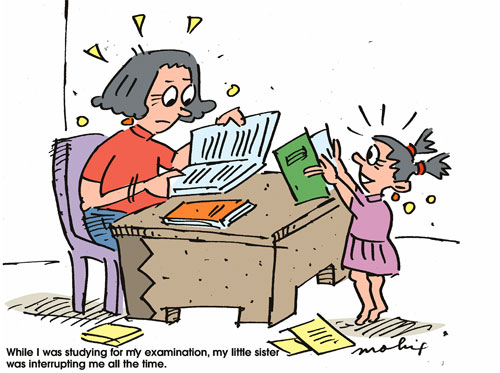|
 by R. S. Karunaratne by R. S. Karunaratne
Past continuous tense
We use the past continuous tense or the past progressive tense to
show that an action was going on at a definite time in the past. Rex and
I were travelling to Kandy last night. While I was studying for my
examination, my little sister was interrupting me all the time.
We were arguing the whole night about who would win the cricket
match. Sam and Clive were watching Titanic for a couple of hours last
evening. The chef was cooking the whole morning to prepare lunch for 100
guests.

We use the past continuous tense for two actions that were going on
at the same time in the past.
Mother was cooking while father was watching television.
While the robbers were running away the police were pursuing them.
The Customs Officers were searching the bags while the passengers were
waiting.
We were listening to a lecturer who was delivering a talk on "Democracy
in Sri Lanka."
While Ben was driving his sister was reading a novel in the back seat.
We use the past continuous tense for a longer action and the simple
past tense for a shorter action.
The two motorists were arguing on the road when the police arrived.
Jeniffer was attending school when the phone started ringing.
Grandmother slipped and fell in the bathroom while she was bathing.
Mike was driving to office when a cyclist knocked against his vehicle.
After studying for four years, Anne graduated with an honours degree.
We use the past continuous tense to refer to repeated actions in the
past.
I was looking for my keys the whole of yesterday.
She was rummaging in a drawer for two hours looking for an important
document.
My hand was hurting the whole of yesterday.
The boats were coming back when we reached the beach.
While the woman was shouting for help, the thieves ran away.
[Activity]
Correct the mistakes in bold type and check your answers with the
key.
1. You was reading when I entered the library.
2. I met her when I shopping in Chennai.
3. When I woke up, the sun shone.
4. I read when you phoned me.
5. You was sleep when I came to meet you.
6. The Titanic crossed the Atlantic when it hit an iceberg.
7. John Lennon walked to his apartment when he was shot.
8. President Kennedy travelled in a limousine when a gunman shot him.
9. The world watched when Neil Armstrong walked on the moon.
10. When I read the phone rang.
Key:
1. were 2. was shopping 3. was shining 4. was reading 5. were
sleeping 6. was crossing 7. was walking 8. was travelling 9.was walking
10. was reading
 Know your prefixes Know your prefixes
[Part 1]
A prefix is a word part you place at the beginning of a word to
change its meaning. The 'pre' in 'prefix' is itself a prefix. "Pre"
means "before" or "in front of". The word "prefix" means 'that which you
fix before." If you know the meaning of the prefixes, you will be able
to guess the meaning of prefixed words. Prefixes "un, dis," and "im"
cause a word to have an "opposite" meaning. Words which have opposite
meanings are called antonyms.
[Skill drill]
Use the prefixes "un, dis" and "im" to give the opposite meaning of
the following words. Check your answers with the key.
1. Fair ....................
2. Certain ....................
3. Happy ....................
4. Able ....................
5. Lucky ....................
6. Friendly ....................
7. Healthy ....................
8. Steady ....................
9. Welcome ....................
10. Worthy ....................
11. Aware ....................
12. Interesting ................
13. Popular ....................
14. Bearable ....................
15. Equal ....................
16. True ....................
17. Easy ....................
18. Fasten ....................
19. Comfort ....................
20. Honest ....................
21. Loyal ....................
22. Belief ....................
23. Approve ....................
24. Taste ....................
25. Connect ....................
26. Trust ....................
27. Polite ....................
28. Proper ....................
29. Mature ....................
30. Moral ....................
Key:
1. unfair 2. uncertain 3. unhappy 4. unable 5. unlucky 6. unfriendly
7. unhealthy 8. unsteady 9. unwelcome 10. unworthy 11. unaware 12.
uninteresting 13. unpopular 14. unbearable 15. unequal 16. untrue 17.
uneasy 18. unfasten 19. discomfort 20. dishonest 21. disloyal 22.
disbelief 23. disapprove 24. distaste 25. disconnect 26. distrust 27.
impolite 28. improper 29. immature 30. immoral |



